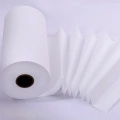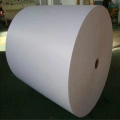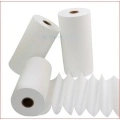Fiberglass air filter paper has emerged as a critical component in modern air purification systems, offering superior performance in various industrial, commercial, and residential settings. Manufactured using a glass microfiber wool wet-forming process, this material is engineered to provide exceptional dust-holding capacity, low airflow resistance, and high mechanical strength. Its versatility allows it to be categorized into three primary series—ASHRAE, HEPA, and ULPA—each tailored to specific filtration requirements. This article explores the technical specifications, applications, and industry relevance of this advanced filtration solution, while highlighting the expertise of its manufacturer, Hebei Fangyu Filters Material Technology Co., Ltd..
Product Overview and Key Features
Fiberglass air filter paper is a high-performance filtration medium designed to capture airborne particles efficiently. The material is composed of ultra-fine glass fibers, which are uniformly distributed during the wet-forming process. This ensures consistent performance and minimizes pressure drop across the filter. The product’s unique properties include:
- High Dust-Hold Capacity: The dense fiber structure allows the filter to trap a significant amount of particulate matter before requiring replacement.
- Low Airflow Resistance: Optimized fiber alignment reduces resistance, ensuring energy-efficient operation in HVAC systems.
- High Mechanical Strength: The robust construction withstands high air velocities and mechanical stress, extending the filter’s lifespan.
These characteristics make fiberglass air filter paper an ideal choice for applications where both efficiency and durability are paramount. The product is available in three main categories, each aligned with specific filtration standards:
1. ASHRAE Series (F5–F9)
The ASHRAE series is designed for general-purpose air filtration in ordinary air-conditioning systems, gas turbine air intakes, and compressors. It offers a range of efficiency levels, with filter grades F5 to F9 providing varying degrees of particle capture. For example:
- F9: 95% efficiency at 0.4 microns, suitable for environments requiring high cleanliness, such as pharmaceutical facilities.
- F8: 90% efficiency, ideal for commercial HVAC systems.
2. HEPA Series (H10–H14)
The HEPA (High-Efficiency Particulate Air) series is engineered for applications demanding ultra-clean air. These filters achieve efficiencies of up to 99.995% for particles as small as 0.3 microns. Key grades include:
- H14: 99.995% efficiency, used in nuclear facilities and high-grade vacuum cleaners.
- H13: 99.97% efficiency, suitable for cleanrooms in semiconductor manufacturing.
3. ULPA Series (U15–U17)
The ULPA (Ultra-Low Penetration Air) series represents the pinnacle of filtration technology, with efficiencies exceeding 99.9999% for particles as small as 0.12 microns. These filters are critical in:
- Chip manufacturing: Ensuring contamination-free environments in microelectronics production.
- Cleanrooms: Maintaining Class 1 or Class 10 cleanliness standards in pharmaceutical and biotech facilities.
Technical Specifications and Performance Metrics
The following table provides a detailed overview of the fiberglass air filter paper’s technical specifications, including efficiency, weight, thickness, and airflow resistance:
| Classification | Grade | Efficiency (%) | Basic Weight (g/m²) | Thickness (mm) @100kPa | Air Resistance (Pa) @5.3cm/s | Tensile Strength (N/m) MD | Stiffness (mg) MD |
|---|---|---|---|---|---|---|---|
| ASHRAE | FY-F9 | 95 | 70 | 0.34 | 55±10 | 1200 | 1200 |
| FY-F8 | 90 | 70 | 0.34 | 35±5 | 1200 | 1200 | |
| FY-F7 | 80 | 70 | 0.34 | 33±5 | 1200 | 1200 | |
| FY-F6 | 60 | 70 | 0.33 | 20±5 | 1200 | 1200 | |
| HEPA | FY-H14 | 99.995 | 70 | 0.34 | 340±20 | 1200 | 1000 |
| FY-H13 | 99.97 | 70 | 0.34 | 290±20 | 1200 | 1000 | |
| FY-H12 | 99.8 | 70 | 0.34 | 250±20 | 1200 | 1000 | |
| FY-H11 | 98 | 70 | 0.34 | 120±20 | 1200 | 1000 | |
| FY-H10 | 94 | 70 | 0.34 | 80±15 | 1200 | 1000 | |
| ULPA | FY-U17 | 99.9999 | 73 | 0.37 | 500±20 | 1200 | 1000 |
| FY-U16 | 99.9999 | 73 | 0.37 | 440±20 | 1200 | 1000 | |
| FY-U15 | 99.999 | 73 | 0.37 | 390±20 | 1200 | 1000 |
Applications Across Industries
The versatility of fiberglass air filter paper makes it indispensable in a wide range of sectors. Key applications include:
- Residential and Commercial HVAC: Enhancing indoor air quality in homes, offices, and public buildings.
- Industrial Filtration: Protecting machinery and processes in manufacturing plants, such as paint spray booths and semiconductor production lines.
- Medical and Pharmaceutical: Ensuring sterile environments in hospitals, laboratories, and drug manufacturing facilities.
- Automotive: Improving cabin air quality in vehicles through HEPA filters in air purifiers.
- Environmental Protection: Reducing emissions from industrial exhaust systems and air purification units.
For example, ULPA filters are critical in chip manufacturing, where even microscopic particles can compromise product quality. Similarly, HEPA filters are essential in pharmaceutical processing to maintain compliance with stringent cleanliness standards.
Company Background: Hebei Fangyu Filters Material Technology Co., Ltd.
Hebei Fangyu Filters Material Technology Co., Ltd. is a leading manufacturer of high-performance filtration materials, specializing in fiberglass air filter paper and related products. With a commitment to innovation and quality, the company adheres to international standards such as EN779/ISO16890, ensuring its products meet the rigorous demands of global markets.
Hebei Fangyu’s expertise in glass microfiber technology enables the production of filters that balance efficiency, durability, and cost-effectiveness. The company’s extensive product range includes HEPA filter paper for sale and HEPA filter paper manufacturers, catering to industries from healthcare to electronics.
As a trusted supplier, Hebei Fangyu provides fiberglass filter paper solutions that address the evolving needs of modern filtration systems. Their focus on research and development ensures continuous improvement in product performance and sustainability.
Conclusion
Fiberglass air filter paper represents a significant advancement in filtration technology, offering unmatched efficiency and reliability across diverse applications. Its technical specifications, as detailed in the table above, highlight the product’s adaptability to varying filtration requirements. Whether used in residential HVAC systems, pharmaceutical cleanrooms, or microelectronic manufacturing, this material plays a vital role in maintaining air quality and operational safety.
For more information about fiberglass air filter paper and other filtration solutions, visit Hebei Fangyu Filters Material Technology Co., Ltd.. Explore their product catalog to find the ideal filter for your specific needs.
Product Images



References
NIST (National Institute of Standards and Technology) provides critical standards and measurements that underpin the development of advanced filtration technologies. For more information, visit the NIST website.
Source: https://www.nist.gov
Hebei Fangyu Filter Material Technology Co.,Ltd is the leading innovative developer and manufacturer all kinds of filter materials in China.pocket filter media factory Located in the economically developed Handan Hebei specialized in various kinds of filter materials from Synthetic Media,Paint stop Filter Media Pre- filter Non Woven Fabric ,Wire Mesh Backed Laminated Filter Media,Ceiling filter Auto Cabin Filter Media, polypropylene filter media, Glass Microfiber Filter Media Nonwoven Fabric,Pre- filter non woven fabric, activated carbon filter materials, EN779 bag filter materials, HEPA filter media, air filter HEPA filter media and Filter Accessories.Our filter materials have passed ISO9001:2000 quality certification since 2005.Certified by ISO9001, UL2 and SGS, with emphasis on quality and service. Our strength is the ability to find innovative ways to meet marketplace or product requirements.activated filter media price|super blog